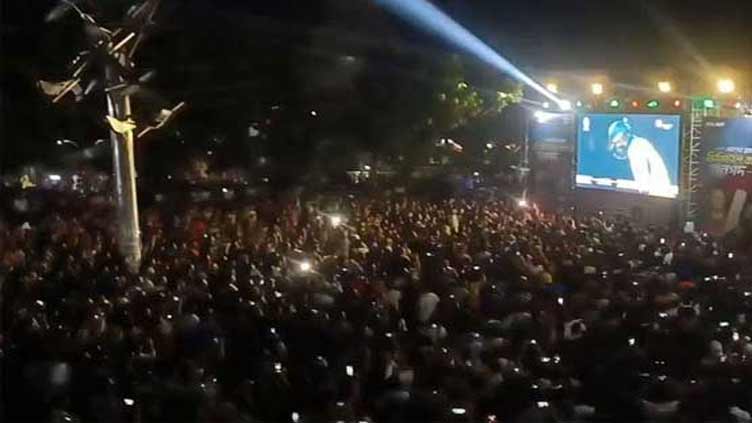Imtiaz Mirza
After dominating the tournament for several weeks, India crashed out to Australia in the final of the recent men’s one-day-international World Cup cricket final. This had sparked a large celebration in Bangladesh, shocking and perhaps hurting the feelings of many Indian fans. A good deal of online mudsling has ensued since. Abstracting from such social media hyperventilation, this piece tries to explore the deeper political meanings of the celebrations.
Firstly, there is a completely cricket-related explanation behind the sense of anger many Bangladeshis feel towards India. India has captured the cricketing world in such a tight vice that it often seems they want to win by any means, even if that involves changing the rules of the game. This might in fact make a team win on the score cards, but a team does not win people’s hearts this way.
For example, the West Indies had dominated the cricketing world for 15 years through their pace battery. They had perhaps injured many opposition players. But they still received much affection from the cricketing world. This is because they didn’t want to win by changing the very nature of the game. They hadn’t tarred cricket the way the BCCI has through money and influence.
This is one reason why many Bangladeshi cricket fans don’t like India. And surveys in other countries would likely show that many people have a strong antipathy towards Indian cricket, particularly its cricket board.
Secondly, there is a healthy cricketing rivalry between India and Bangladesh —recent examples include the Asia Cup, the T-20 match, but it also goes back to a disputed no-ball in the 2015 World Cup. These often exercise the minds of the Bangladeshi fans. It is not necessarily the case that all these incidents are reality-based, or that the truth is entirely on the side of either team. Nonetheless, this cricketing rivalry means that one shouldn’t assume Bangladeshi cricket fans will support the Indian team just because they are a subcontinent team or both countries have a closer tie.
Nonetheless, there are in fact many Indian supporters in Bangladesh. Those who had followed cricket in the country since before 1990 had traditionally supported either India or Pakistan. Rather the support for India has increased as the team has become stronger. Most Bangladeshi cricket fans admire Tendulkar’s sublime batting that ruled the 90’s . Kohli’s gamesmanship is well liked, especially after his arrogance has been toned down.Kapil Dev and Gavaskar still have a large following among the cricket cognoscenti in Bangladesh.
Had India won in the final, there would have been many Bangladeshis celebrating it. There is nothing to feel hurt or upset about this. Such a scenario is in fact quite common in Bangladesh. It might surprise many Indians, but few Bangladeshis would find it unusual.
Fourthly, and moving beyond cricket, India’s role in 1971 has come up in this debate. Of course, India has supported Bangladesh in its Liberation War, not the least by hosting 10 million refugees. Bangladeshis are grateful for this, and the appreciation has been articulated in many ways over the years. Further, Bangladeshis have in fact tacitly accepted many unjust Indian actions such as Farakka and other water sharing agreements or killings by the BSF in the border.
Now, there was also a realpolitik reason for India’s support of Bangladesh in 1971. If nothing else, India is much safer to have Bangladesh in its sensitive eastern border than a part of the nuclear powered Pakistan. That is, the Bangladesh Liberation War has in fact given India tremendous benefit.
Fifthly, judging by many social media comments, one gets the sense that many Indians think that onions and various other goods that are exported from India are given as grants to Bangladesh. The Indian central government may provide relief to poorer Indian citizens, but they are not in fact rich enough to provide grants to Bangladesh. Onion and other goods are, in fact, bought by Bangladeshis with hard currency.
When Bangladeshis visit India for tourism, it is the Indians who benefit from it.
When Bangladeshis visit India for medical reasons, they pay for the service. It is not at all reasonable to expect that one cannot cheer the sporting loss of a trading partner. Let me give an example.
Canada and the USA are sporting rivals, even though 70% of Canadian products are exported to the US. No one in America particularly cares about Canadian celebrations about American loss in basketball, ice hockey or baseball. It is rather silly to expect one country to curb their sporting celebration because of their trade relationship.
Finally, and most importantly —perhaps the issue where most Indians have minimum appreciation about Bangladesh is concerned with politics. Perhaps because of propaganda, or perhaps they only interact with Awami Leaguers —it is probably common among the Indians to think that Bangladesh’s current prime minister heads a decent government. Yes, the current prime minister and her Awami League party is pro-Indian. In fact they are more pro-Indian than most Indians, so much so that they would usually address Indian interests and rights at the cost of Bangladeshi ones in any agreement.
Now, Indians are used to democracy and the exercising of the right to vote. In contrast, Bangladeshis have been denied the right to vote in the last two elections, and there is a totalitarian regime in power. It is as if Modi or Rahul Gandhi had captured power in India without any vote.
And instead of aligning with the people of Bangladesh, both Congress and BJP had helped the Awami League establish this dictatorship. This dictatorial regime has plundered billions of dollars out of the country, and like colonial rulers have laundered the money overseas. It has killed, extrajudicially, 2,597 members of the opposition BNP.
Because these things are happening with clear Indian support, the India-backed Awami League is now an object of disgust for Bangladeshis. And it is that disgust that has found an outlet in the Bangladeshi celebration after India’s cricket loss.
_____
Imtiaz Mirza is a Bangladeshi blogger and writer.


